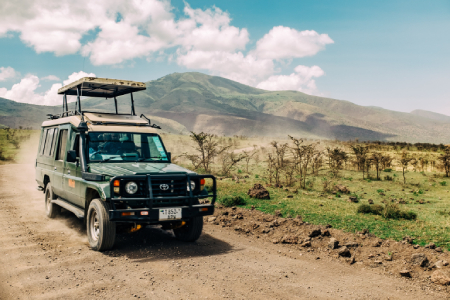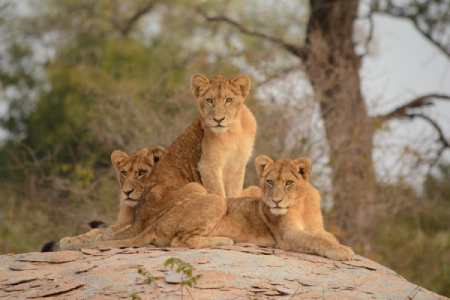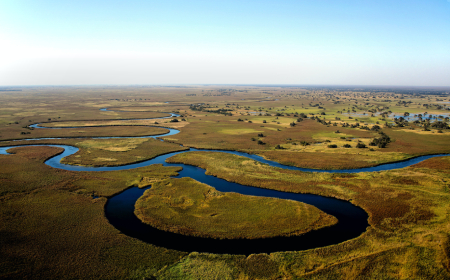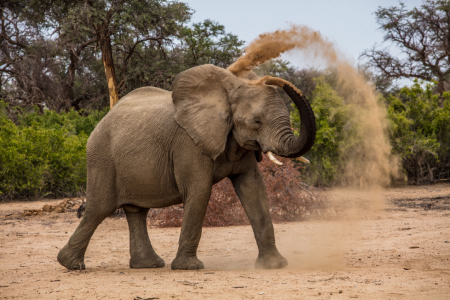Savouring & Saving Africa's Wilderness

Photo: Car driving through a Safari - Photo Credit: Ashim D'Silva from Unsplash
Long gone are the days of venturing out into the throes of untamed lands to indiscriminately hunt wild animals. Today, discovering the last remnants of true wilderness, witnessing the likes of lions and elephants and glimpses of the ancient roots of our modern world, comes paired with directly helping to save it.
In this day and age, some words don’t mean what they used to. There’s no one particular reason for it: Language evolves to fit and match the happenings of the world—an information ecosystem, if you will. For example: luxury. Luxury stopped meaning plush pillows, chocolates left on the bed, gilded wall trim, buttered lobster and a bottle of vintage Chardonnay sometime after the Industrial Revolution. It’s not the enjoyment of materials anymore; it’s the collection of experiences, the one-of-a-kind memories you savor in your lifetime. A luxurious life is one filled with moments others have to read in books and watch in movies to find.
Another word that’s changed? Conservation. “Take only memories, leave only footprints” isn’t quite cutting it anymore. Changing the world for the better requires a proactive approach, as every dollar spent today is a vote for what the world will be like tomorrow. As with any ballot, you should know what you’re voting for.
These two modern definitions would seem, at a glance, directly at odds with each other. But, our third word with a new definition? Safaris. Long gone are the days of venturing out into the throes of untamed lands to indiscriminately hunt wild animals. Modern safaris are the epitome of luxury conservation, making them an ideal choice for an adventure you can enjoy wholeheartedly.

Photo: 3 Lions at Kruger National Park in South Africa - Photo Credit: Diego Morales from Unsplash
South Africa
South Africa is one of the few places in the world to boast both modern metropolises and wilderness areas—vast expanses of nature that are completely undisturbed by mankind. With 28 formally designated wilderness areas composing a sum just over 10,000 square miles, their wilderness (though seemingly immense) is finite, a precious resource in itself. Luckily, the ways to savour it—and subsequently save it—are equally immense.
For a smorgasbord approach, a tour would offer the most land covered, the most majesty witnessed and the noblest causes to contribute to. As a singular example, &Beyond is expansive in every regard—the absolute forefront of ethical tourism. Providing access to exclusive lodges, tailormade tours, small group journeys and bespoke experiences, every adventure they supply is backed by the promise to make a difference with contributions to their many partnerships. Game drives through Kruger National Park come with the promise to contribute to Rhinos Without Borders and the Lionscape Coalition, whale sightings and winery tours come with the promise to contribute to Oceans Without Borders, while enjoying a hands-on conservation lesson at the Phinda Private Game Reserve comes with the promise to contribute to the development of the local community. Most importantly: None of these contributions are exclusively linked. Enjoying one part of South Africa’s wilderness means helping save all of it.
For a singular immersion into the enchantment of one location, you can’t go wrong with a lodge. Often nestled within a stunning landscape like the Sabi Sands Game Reserve or the Garden Route, these luxe hideaways often feel like part-resort and part-tree fort; the tiniest blip of civilization amongst expansive wonder. A prime example can be found at both Singita Boulders Lodge and Singita Ebony Lodge. At these distinct lodges along the riverside within the Sabi Sands Game Reserve, the relationship between the lodge and the reserve is symbiotic—the pristine nature serves as the primary draw for the lodge’s business, and in return the lodge assumes the role of warden: guarding against the poaching of endangered species and helping threatened ecosystems thrive. While you yourself may not directly run the poachers off the land, hearing hippos grunt in the distance from the comfort of your accommodations is life-changing enough.

Photo: Aerial view of Okavango River in Botswana - Photo Credit: Wynand Uys from Unsplash
Botswana
Sharing the northern border of South Africa is the nation of Botswana, a country primarily composed of the Kalahari Desert and the Okavango Delta. As such, it is one of the most sparsely populated countries in the world—a single day trip from a major city feels worlds away from civilization. Lodges prove to be the best bet as a base of operations in these generally uninhabited, yet utterly gorgeous, settings, as immersive structures allow for an unimaginable intimacy to lands devoid of human interference.
Zarafa Camp is established on the edge of the Zibadianja Lagoon, a prominent watering hole for all walks of African wildlife within the Selinda Reserve. Built entirely from recycled hardwoods and canvas, the camp is completely self-sufficient thanks to its own solar farm and bio-gas system. As striking as all this infrastructure would seem, Zarafa Camp is essentially camouflaged from the wildlife—leaving you perfectly situated to witness the politics and drama of the animal kingdom from your deck.
Another equally prominent option for discovering Botswana’s beauty is Duba Plains Camp. Embedded within the heart of the Okavango Delta, the camp channels the safaris of the famed 1920s in aesthetic underneath the cool shade of the giant ebony trees. The amenities are more modern: environmentally friendly air-conditioning, ceiling fans, a wine cellar and a library all combine for a camping trip you never thought possible. Right below and beyond your lodging, lions, elephants and buffalo combine as your de facto neighbours.
The best part about both of these lodges? They help comprise Great Plains Conservation. Built upon the belief that wildlife survival hinges on protected landscapes that allow for migration routes, Great Plains Conservation acquires hunting and agricultural land to convert to wildlife conservation grounds. The collective whole of the land is supported by the income of a handful of light-footprint safari camps. Add in the sibling-nonprofit The Great Plains Foundation, and you’ll sleep easy knowing that the lions serenading your camp are being saved thanks in part to your visit.

Photo: Elephant in Namibia - Photo Credit: Alan J. Hendry from Unsplash
Namibia
Directly due east of Botswana is Namibia—the country with the least amount of rainfall on the continent this side of the Sahara. But, where rainfall is lacking, life is not. There is a thriving ecosystem here in this arid expanse, making for moments of otherworldly wonder within a visit. Much of Africa’s quintessential creatures reside here, having specially adapted for desert life—lions, rhinos, giraffes, elephants and wildebeest can be found amongst the scruffy brush, hills and dunes. Rivers bring with them the infamous Nile crocodile.
With regards to lodges, Damaraland Camp is uniquely positioned as a standout option. Owned and run by the local community as part of a revolutionary community-conservancy model, Damaraland Camp sits in the Huab River Valley, sporting views of the surrounding stunning scenery—plains, valleys and peaks of mountains as far as the eye can see. It’s here, at these eco-friendly adobe-styled abodes that you’ll find the perfect base camp for discovering the Haub River system, as well as peace of mind for helping it flourish.
Of course, if your primary goal is to witness wildlife, know that the large game moves with the seasonal rainfall—giving “off-season” an entirely new meaning. To up your chances of witnessing desert denizens, opt for a guided exploration. Wilderness Safaris offers opportunities to cross the desert in intimate group sizes, tracking the elephants and rhinos as you go. Double the fulfillment with the knowledge that you are supporting ecotourism—Wilderness Safaris serves multiple roles in anti-elephant poaching, desert lion conservation and fostering neighbouring communities. Like every aforementioned company, they go beyond letting you leave only footprints—they help you leave the wilderness better than you found it.
Don't wait to plan your unforgettable safari!
Reprinted with permission from Travel Leaders Network | Justin Gibson | August 26, 2020
Hero Image by Harshil Gudka from Unsplash

